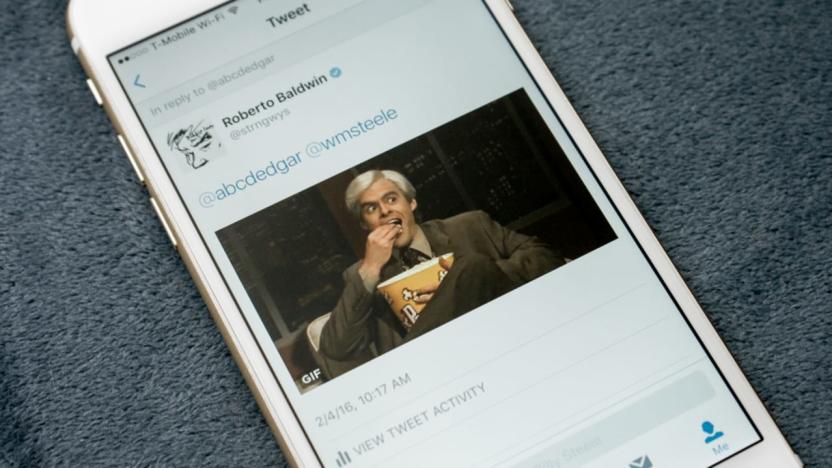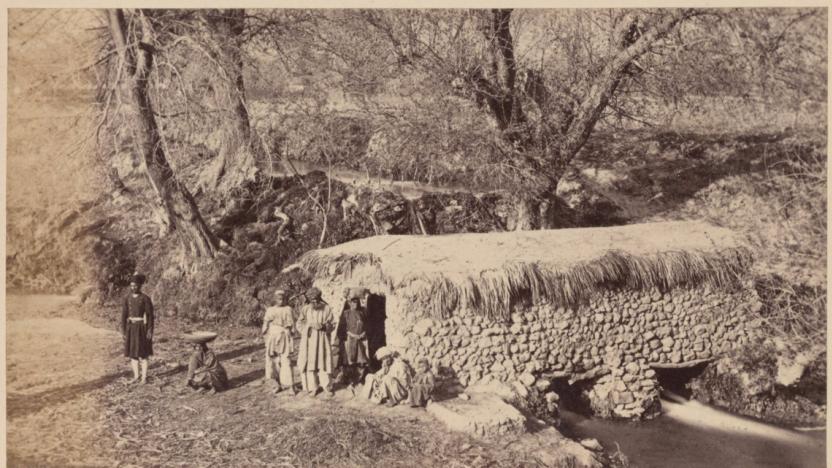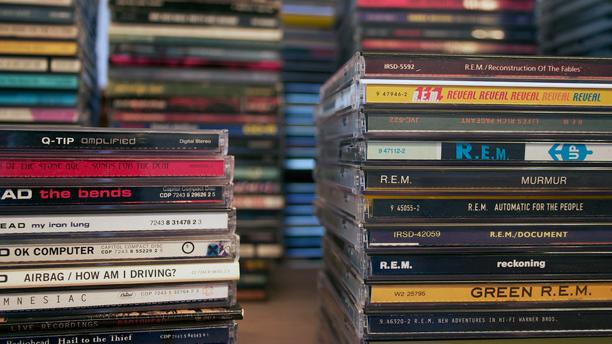libraryofcongress
Latest

The Library of Congress will start limiting its Twitter archives in 2018
It doesn't seem odd anymore that governments might want to save Twitter archives for historical purposes, what with all the attention our president gets for his contributions to the platform. The UK has been saving tweets and YouTube videos as historic media since 2014, while our own Library of Congress made it a practice since 2010. Now, however, the folks who manage the Twitter archive at the Library of Congress have announced that as of January 1st, they will only save tweets "on a selective basis."

Library of Congress archives select webcomics for posterity
Webcomics have been around for a long while, and that's raising a question: who's going to preserve those comics for online viewing outside of non-profits like the Internet Archive? The Library of Congress, that's who. It just launched a Webcomics Web Archive that curates stand-out strips. Many of them are award-winning or otherwise stand-out comics that you may have read -- the nerdiness of XKCD and the historical spoofs of Hark! A Vagrant are among the initial batch.

Library of Congress repatriates 163,000 files to Afghanistan
The Library of Congress has completed a three-year project to digitize 163,000 documents relating to the cultural history of Afghanistan, and this week officials handed over these hard drives to the Afghan Minister of Information and Culture, Abdul Bari Jahani, and Abdul Wahid Wafa, Executive Director of the Afghanistan Centre at Kabul University. The collection will reside in 10 Afghan institutions, including the National Library of Afghanistan, National Archive of Afghanistan, American University of Afghanistan, Kabul University and Kandahar University. This concludes a project that began in January 2013 with a grant from the Carnegie Corporation of New York.

Copyright exemption lets you modify old games to keep them running
You no longer have to dread the day that a game developer shuts off its servers and renders your favorite title unplayable. As part of a series of DMCA copyright exemptions, the US Library of Congress has granted long-sought permission to disable authentication server requirements in games where a server's shutdown will completely break the experience. Historians can even hack the consoles themselves, if necessary. This doesn't allow you to tweak games where you'd only lose multiplayer modes, but it does mean that at least some aspects of a classic game will live on.

Digital liberty advocates want the right to resurrect old online games
It's great that many games have strong online components, but there's a dark side to that connectedness: if the developers (or their partners) shut down necessary servers, those titles are likely to break. You won't have to worry about your favorite game going dark if the Electronic Frontier Foundation has its way, however. The liberty-minded advocacy group has filed a Digital Millennium Copyright Act exemption request with the Library of Congress that would give Americans the right to keep online play alive in old, abandoned games by modifying the code to point to unofficial services. While the request wouldn't cover games where most of the content is stored online, it would address single-player releases that demand internet-based activation just to run.

Artist creates hilariously surreal GIFs from Library of Congress photos
Despite the myriad communication options we as a technologically advanced have at our fingertips (literally), sometimes nothing gets our point across better than a GIF. Despite the amount of weird ones (and arty samples) we've seen, none quite hit the vibe that Droga5's art director Kevin Weir concocts though. As This Is Colossal has spotted, Weir uses historic images from the Library of Congress' online archives to create the sometimes creepy animated photos you see above and below. Weir says that he started making these in an effort to keep himself busy during downtime at a grad-program internship, and has since started posting them to his blog Flux Machine. Next time you need a trump card in a GIF war, well, now you have another place to look.

Library of Congress finds unreleased 'Duke Nukem' code lurking in its catalog
When a video game studio cancels a project, the code tends to stay with the developers or else disappear into the void. Either way, you're unlikely to ever see it. However, the Library of Congress' David Gibson has unearthed a rare gem. While sifting through a stack of games destined for the archives, he found code and media assets for an unreleased PlayStation Portable version of Duke Nukem: Critical Mass. While Sony's many proprietary file formats made it tricky to poke around, homebrew tools were enough to uncover 3D models, music and textures, including those for Duke himself (shown here). And in case you're wondering, this is a first-of-a-kind discovery; to Gibson's knowledge, every other game in the Library has shipped.

Here's what the phone unlocking bill means, and how it affects our future
Getting Democrats and Republicans to pass an act of Congress is the exception more than the rule. But if there's one thing both sides of the aisle can agree on, it's that the US policy for unlocking phones is backwards. Early last year, it became illegal to unlock your handset for use on other carriers unless your provider directly gives you the permission to do so. Thanks to moves from the Senate and House this month, legislation to remove this restriction is just a presidential signature away from passing; it's not a permanent solution, but at least it's a step in the right direction for consumer freedom.

The Library of Congress is wrecking CDs to learn how to save them
Like it or not, CDs rot over time -- your well-worn copy of Soundgarden's Superunknown might not play anymore. Just how they rot is frequently a mystery, though, which is why the Library of Congress is currently destroying CDs (including those you donate) in hopes of improving its archival techniques. Researchers are using a combination of artificial aging tests and simple observations to see what factors trigger decay, sometimes with surprising results. As the Library tells The Atlantic, data loss varies widely between manufacturing processes, the lasers in CD players and even individual discs; experimenters can subject two identical copies of an album to extreme heat and lose only one of them.

First message sent from space to be preserved by Library of Congress (video)
A 1958 message by then-President Dwight Eisenhower sent from space has been selected for the National Recording Registry archives alongside 25 other notable recordings like Pink Floyd's The Dark Side of the Moon and, er, Chubby Checker's The Twist. Each audio recording was selected by the Library of Congress because of their cultural, artistic or historic importance to the United States, however, the first message ever broadcasted from a space satellite was a short one. Eisenhower's 30-second speech included "America's wish for peace on Earth and goodwill toward men everywhere" and could be heard on shortwave radio as the satellite passed overhead. Project Signal Communications by Orbiting Relay Equipment (SCORE) was the world's first communications satellite and we've added a suitably old-school newsreel of its launch (and that slightly scrambled message) after the break.

White House announces support for unlocking cell phones
A petition on the White House's website to work for a new law universally allowing the unlocking of cell phones recently raised more than 100,000 signatures from the public, and the White House has now officially responded to the idea, stating its support. The petition refers to Section 1201 of the Library of Congress' rules, which disallows users from unlocking their cell phones (including iPhones) for any reason, even when any contracts associated with the phones has expired. The phone industry says the rule is needed in order to keep illegal phone trafficking down, but obviously lots of consumers disagree, saying that the rule is prohibitive and often leads to lots of expensive fees. The White House's statement of support isn't exactly legally powerful, as it doesn't have any direct control over the rule or the Library of Congress. But the president's office can push for a new law to overturn the rule, and of course an official statement of support from the White House can do a lot to push the issue forward. The Library of Congress sent TUAW a statement saying that "we also agree with the administration that the question of locked cell phones has implications for telecommunications policy and that it would benefit from review and resolution in that context." So there's more "review" to be done on this issue. But for now, it sounds like there's both public and administration support for a change to the rule, which means there may come a time in the future when you're guaranteed to the right to unlock your phone whenever you want.

Smartphone petition breaks 100,000 signatures, forces White House response
The petition to reinstate the DMCA protection of smartphone unlockers has reached 100,000 signatories on We The People. As it's now hit the golden limit, the White House will have to issue an official response explaining its stance on the matter. The petition also asked that if the Librarian of Congress wouldn't bring back the exemption, that a bill should be passed that enshrines the right into law. As soon we see the message from the West Wing, we'll let you know what they say.

Library of Congress unveils plan to preserve early US sound recordings
Historic audio recordings aren't exactly easy to access and play back since they're often in obscure or aging formats and sit within giant repositories and private collections, but the Library of Congress is gearing up to help change that for researchers and the average joe. The outfit's freshly announced National Recording Preservation Plan is headlined by a recommendation to create a publicly accessible national directory of sound recordings that'll act as an "authoritative discography" with details regarding their production and where copies are housed. You'll still have to take a trip to a library to hear the recordings for the time being, but the Library of Congress is hoping to hammer out licensing agreements that would allow for online streaming. Developing new preservation standards and creating university-based degree programs for audio archiving are also among the 32 short- and long-term recommendations spelled out by the document. Click the second source link to peruse the paper yourself. [Image credit: Ray Tsang, Flickr]

Unlocking new phones now banned under DMCA, the EFF weighs in
It was great while it lasted, but the days of users legally unlocking their own phones is over. Back in October of last year, the Library of Congress added an exemption to the DMCA to allow folks to free their new phones for 90 days. That three month window has now closed. Of course, carriers are still free to offer unlocked handsets themselves, and some will also unlock them for you as long as certain conditions are met. "Legacy" or used handsets purchased before today can still be unlocked without any finger-wagging from federal courts. So, what does this mean exactly? Well, Electronic Frontier Foundation attorney Mitch Stoltz told us, "What's happening is not that the Copyright Office is declaring unlocking to be illegal, but rather that they're taking away a shield that unlockers could use in court if they get sued." This does make lawsuits much more likely according to him, but it's still up to the courts to decide the actual legality of phone unlocking. Indeed, it's a grim day for those who want true freedom over their own devices. Stoltz said to us, "This shows just how absurd the Digital Millennium Copyright Act is: a law that was supposed to stop the breaking of digital locks on copyrighted materials has led to the Librarian of Congress trying to regulate the used cellphone market."

Sony and Library of Congress launch streaming National Jukebox, ready to DJ at your local speakeasy
Who's better, Sammy Hagar or The Great Caruso? We know you have every track the Red Rocker ever laid down, but if you haven't upgraded your gramophones of the great Italian tenor, today is the first day of the rest of your life. The Library of Congress, working with Sony, now streams a collection of 10,000 historical recordings, including Caruso and other pre-1925 greats. This "National Jukebox" is a bit of a hodge-podge, including everything from early jazz to poetry to yodeling, but digging through the archive is half the fun. But while access to this material is great for sound preservationists, commenters on BoingBoing point out that it's not truly public domain work: thanks to our spaghetti-tangle of copyright arcana, Sony still owns the rights. It's allowing users to stream but not download, and technically could revoke its gratis license at any time. So get your Caruso fix while you can.

Alexander Graham Bell's sketchbook reveals ridiculously wonderful imaginings
The image above is a page from Alexander Graham Bell's sketchbook, a self-portrait from the 1870's, is just one page from the large collection of the inventor's papers, now housed at the Library of Congress. Bell's sketches which document the invention of the telephone are the most fascinating of the lot, and happily, the Library has digitized them and made a large selection of them available online.

Library of Congress receives 200,000 vintage master recordings from Universal, will stream them online
The US Library of Congress hasn't been shy about embracing the modern age of digital media, though in this case it's having to deal with some decidedly lower-fi data storage. Universal Music Group has announced it's donating over 200,000 master recordings of early 20th century music to the Library, which will be cataloged and digitized -- for future safekeeping and in order to be streamed online starting in the spring. It doesn't seem, however, that the intellectual property rights will be passing with these recordings, as the press release states this agreement continues the Library's "unprecedented authority to stream commercially owned sound recordings online." Either way, it's good to know that the original copies of works by the likes of Louis Armstrong, Billy Holiday and Ella Fitzgerald will reside in the hands of an organization dedicated to their preservation. Full press release follows after the break.

Library of Congress eyes National Film Registry streaming scheme
In the digital age, libraries all over the country have been looking for ways to remain relevant and useful as they continue their core mission of giving people access to media and educational materials. To that end, The Library of Congress has announced plans to make selections from the National Film Registry available for streaming online. Of course, as the Federal Times notes, some of the copyright owners might balk at the suggestion (it's hard to imagine George Lucas ever letting anyone freely stream Star Wars) but in theory this isn't a bad idea, at all. "I hope we'll be able to work something out," said Librarian of Congress James Billington. "[The registry] has great educational and inspirational as well as entertainment value." Besides, if you don't give kids a legal, safe way to watch the classic W.C. Fields flick "It's a Gift" (1934), they're just going to get it from illegal torrent sites or from guys selling bootleg DVDs on Penn Avenue in Garfield.

Report warns that Copyright Act threatens recorded sound preservation
A new report issued by the Library of Congress entitled The State of Recorded Sound Preservation in the United States: A National Legacy at Risk in the Digital Age, has some sobering findings on the state of historic audio, whether on vinyl, wax cylinders, or optical disc: namely, that it's "at risk." What does that mean, exactly? It seems that a combination of antiquated copyright laws and a wide array of digital formats means that libraries are often unable to back up its holdings (even when it is legal to do so). "Were the law strictly enforced," the report explains, "it would brand virtually all audio preservation as illegal." It goes on to detail steps that could be taken to fix these problems, were lawmakers not too busy grandstanding and cozying up to special interest groups, including: reformation of the Copyright Act, decriminalizing the use of orphan works for which no rights holder can be established, establish a legal way for third parties to reissue long out-of-print "abandoned recordings," and establishing legal ways for libraries to more easily make audio copies and share files.

Library of Congress rules in favor of jailbreaking
Today, the Library of Congress has ruled in favor of both jailbreaking and unlocking phones according to an Associated Press Statement published on the New York Times. The Library of Congress statement can be found here if you'd prefer to read the original. The Washington Post has also picked up this story. This ruling responds to an EFF petition, one opposed by Apple, that maintains the current status quo, allowing iPhone owners to continue both practices, and pushes things even further. Jailbreaking allows iPhone owners to download third party applications outside of Apple channels and unlocking offers a way to use iPhones on third party GSM networks, typically T-Mobile.








